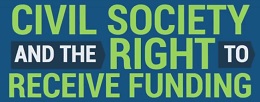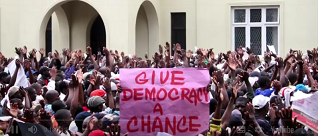| Receiving financing or other resources is in fact an integral part of the right to create associations or Civil Society Organizations (CSOs). |
The right of citizens to form associations and receive funding to pursue their missions is enshrined in international human rights law. Yet over 160 laws in nearly  70 countries have been passed to restrict this right since 2012 (as reported by the International Center for Not-for-Profit Law - ICNL). These laws severely constrain the ability of CSOs to implement programs that serve their communities and ultimately threaten their sustainability.
70 countries have been passed to restrict this right since 2012 (as reported by the International Center for Not-for-Profit Law - ICNL). These laws severely constrain the ability of CSOs to implement programs that serve their communities and ultimately threaten their sustainability.
All people have the right to join together to make their communities and the world a better place. To achieve this, everyone needs a safe, legal environment that supports civic freedoms, philanthropy, and public participation with civil society organizations, governments, and the international community to strengthen the legal environment.
The crackdown on the right of Civil Society Organizations (CSOs) to access resources, both domestic and foreign, has reached all corners of the world and  manifested in various forms. CSOs need to be aware of their right to resources and how to respond in the face of government restrictions.
manifested in various forms. CSOs need to be aware of their right to resources and how to respond in the face of government restrictions.
Restrictions on civil society’s ability to access funding are not limited to specific laws but can be disguised in administrative provisions and practices or extralegal activities coordinated by governments against independent CSOs. Governments often target CSOs that receive international funding by publicly accusing them of being “foreign agents” or corrupt. They place burdensome restrictions on banks and insurers to discourage them from providing services to CSO that receive funding or place travel restrictions on CSO employees. They may also encourage pro-government groups and media outlets to harass or slander CSOs that receive international funding from legal sources.
INTERNATIONAL LAW
With international law, petitioners can respond to and challenge restrictions. The Human Rights Council, the UN body charged with authoritative interpretation of the International Covenant on Civil and Political Rights (ICCPR), has published several communications in defense of access to resources.
The World Movement for Democracy (WMD) provides a set of tools to help activists protect their right to access resources HERE. Furthermore, interested parties and petitioners may contact the WMD at world@ned.org.
Comments powered by CComment